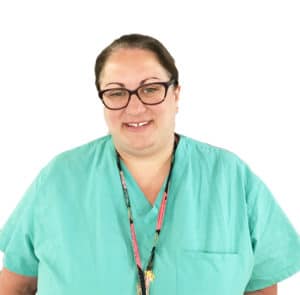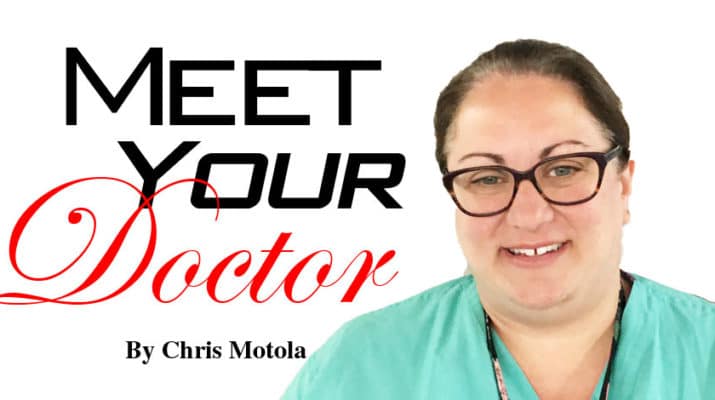Gynecologist affiliated with Crouse Hospital talks about caring for women who delivered babies during COVID-19 pandemic
By Chris Motola

Q: I take it people are still having babies through the pandemic.
A: I was sort of joking with someone the other day about how it didn’t stop women from having their babies. It did change how we do things in the office and in the hospital. For example, how many support people you can have in the delivery room, the protective equipment we have to wear which, for labor, really isn’t optimal. So it’s those kinds of things that have affected our day-to-day at the office and at the hospital.
Q: How do you prepare prospective mothers to deal with it?
A: It’s challenging. As we’ve progressed with this, the rules have changed, sometimes even daily. Just trying to keep them informed about what the hospital policy is, what to do at home. When can family come to visit the baby? When is it OK to be around the baby? We use a lot of different specialists, so we rely on the pediatricians to tell patients when they get home from the hospital to quarantine for at least 14 days, especially if they have elderly parents who would normally help them out. Getting them mentally prepared during the visit is important. It’s hard whether you’re a new mom or a mom with kids at home, having someone come in to help is a big deal. I can’t imagine having to go home with a newborn and only having your husband to help. You need time to do things as simple as laundry, taking a shower. So I think as we’ve progressed through the pandemic it’s gotten a bit easier. Before we were saying don’t have anyone come around the baby for six weeks, now we’re saying around two weeks as long as nobody’s sick and they’re wearing masks.
Q: COVID’s risk factors seem to generally increase with age. How much of a risk are infants?
A: There’s definitely concern about infant exposure, but I haven’t seen much about babies getting really sick. I also haven’t had any COVID-positive moms. There’s always a risk of exposure to the babies though, especially if mom was exposed.
Q: Has there been any research into transmission through parents?
A: I’m not aware of any reports of transmission through the mom, and I haven’t seen any research or report on babies that have tested positive if mom tested positive. No defects that I’m aware of in babies.
Q: Do you expect an increased demand for obstetric services in the near future?
A: I think it’ll have an impact as far there’re going to be more pregnancies after quarantine, if you ask me. People have been stuck inside with nothing better to do, so I think we’re probably going to have more babies. But I think it can go the other way with women who are afraid of being exposed and may skip their pap and pelvic exams. So it can go either way.
Q: Has a backlog been building on the gynecological side?
A: Up until recently, we were doing half days and only seeing obstetric patients and emergency visits. So we had all of our routine appointments back to reduce exposure to our staff and pregnant patients. So we have a very big backlog of routine stuff we’ll be catching up on over the next few months. We’re busy doing that. I think the vast majority of patients seem willing to come back, but do have some that are asking to push it back a bit longer because they’re still worried about exposure.
Q: What brought you to Crouse?
A: I grew up in Cicero, I graduated high school from CNS, went to college at Geneseo. I came back to CNY to Upstate Medical for medical school. The residency program at Upstate works out of Crouse, so I guess you can say I’m a lifer.
Q: Do many of the younger trainees stay?
A: Not very many, no, which is unfortunate for the area, because we’ve had a lot of OB-GYNs in the area recently retire. We see a lot come through for their training but then go back to wherever they came from or to other towns. I think in the last three or four years, we had one stay from the residency program and two come in through the Buffalo program, so I don’t see a lot staying.
Q: Are you involved with fertility treatments?
A: I do a lot of contraception, which is true of a lot of GYNs, but I also have a lot patients who I’ll start the infertility workup for. I’ll do ovulation induction and check the fallopian tubes and that kind of thing. I don’t do any of the advanced infertility treatments — I’ll refer them out for that. But the patients who just need a little bit of help, like the ones with polycystic ovarian syndrome, that’s something that I enjoy doing, and there are a reasonable number of women who can be helped without having to see a specialist.
Lifelines
Name: Maria Ciciarelli, M.D., FACOG
Position: Gynecologist with CNY Women’s Healthcare, affiliated with Crouse Health
Hometown: Cicero
Education: SUNY Upstate Medical
Affiliations: Crouse Hospital
Organizations: Board-certified with American College of Obstetrics and Genecology, American College of Obstetrics and Gynecology (ACOG)
Specialty: Contraception, adolescent medicine, infertility, skin injections
Family: Husband; daughter 16; son 15
Hobbies: Gardening; hanging out by the pool; time with family

